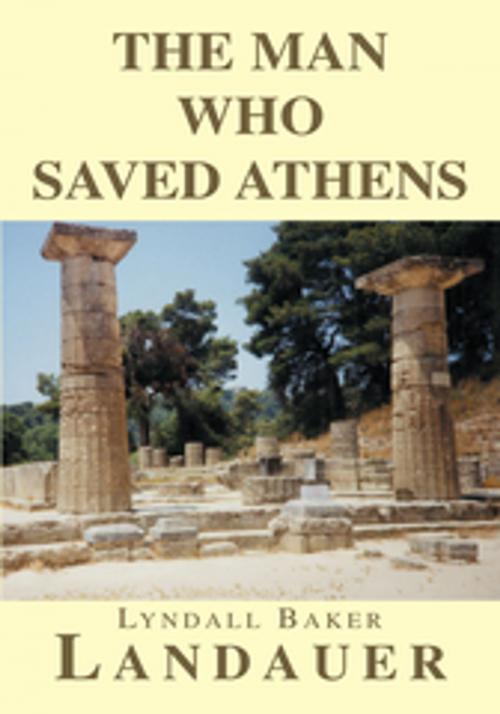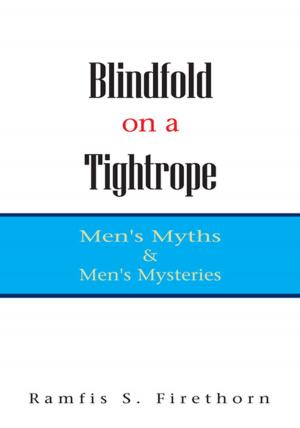| Author: | Lyndall Baker Landauer | ISBN: | 9781465326188 |
| Publisher: | Xlibris US | Publication: | June 10, 2002 |
| Imprint: | Xlibris US | Language: | English |
| Author: | Lyndall Baker Landauer |
| ISBN: | 9781465326188 |
| Publisher: | Xlibris US |
| Publication: | June 10, 2002 |
| Imprint: | Xlibris US |
| Language: | English |
Themistokles (born in what we now call 528 BC) is eighteen years old when the story begins and anxiously awaiting the vote in the Athenian assembly that will make his dreams come true. Son of an Athenian citizen of ancient, respected family, he always wanted to be a political leader of Athens because his mother was born on foreign soil. But now the rules are about to change. When the vote comes and he is suddenly eligible for public office, he embarks on a plan to ready himself for it. His father, who lives at the family home in Attica, is rigidly against his son being involved in the messy and degrading politics of Athens. They argue. Themistokles is adamant, sees no place for him on the family estates which now are sadly depleted and facing ruin, and leaves home. He takes up permanent residence in a hovel in Athens. His father is doubly ashamed of the rudeness and squalor of his living arrangements.
Themistokles puts in his two year duty in the army as a hoplite or regular foot soldier, as required of all male citizens. In the midst of his training an attack comes from the east and he and his phalanx are detailed to stand and repel the invaders. It is a bloody battle, and some of his fellow soldiers cannot stop killing even when the battle is over. Still he has learned how the army works and, more important, how the leadership operates.
At the age of twenty eight, Themistokles goes home to get married. This is a union arranged by his father with a girl he has seen only once. Erinna is a beautiful girl of fifteen, who cannot even look him in the eye. He takes part in all the wedding ritual to please his father. A boyhood friend named Harpatides tells him what to do, when to do it and stands as his companion. When the happy couple retire from the celebration to their new home, Erinna dissolves into tears. During the first weeks of their marriage, she merely tolerates his touch and his presence, but seldom speaks to him. She spends a great deal of the time crying and will not talk. He is disappointed but not surprised at her behavior and goes back to Athens.
A few years later, the governing body of Athens decides to send a fleet to help a colony in Asia Minor, occupied by Athenians, in a revolt against their Persian masters. Themistokles wants to see how the navy works and do it in secret. He signs onto one of the ships as a lowly oarsman under a false name. His fellow rowers are all free Athenian workers. After a week-long trip across the Aegean Sea, the ships dock and he is able to visit the towns in revolt as well as the grand city of Ephesus. He studies the way the Persians live and how they rule their subject nations. In the long run the revolt is put down and the fleet must scamper back to Athens.
When Themistokles reaches home, now a small brick house in Athens, he finds that his slave, Sikinnos, given to him by his father, has taken a homeless girl named Hesione into his house to work for him. He also finds that his father, his wife and his son have died in a plague. After the rituals and ceremonies necessary to such a tragedy, he leaves his boyhood home and never expects to return.
Themistokles is voted Eponymous Archon when he is thirty-five years old and his name is given to that year in Athens history. He is now a power among the ruling elite of Athens, a boyhood dream. There are rumblings of an attack from Persia and he urges the city to prepare. When his one year term is over, he is elected strategos, or general, by his home region. As such he and his fellow hoplites take part in the Battle of Marathon. This great battle on the eastern coast of Attica, is a great triumph for the Greeks and a disastrous defeat for the Persian ruler, Xerxes.
Then Themistokles embarks on his program of building defenses for Athens and other Greek cities. He wants to create a fleet of ships that will be able to defeat the Persians before they reach Athens. The ship he chooses is a new kind of ship, a trire
Themistokles (born in what we now call 528 BC) is eighteen years old when the story begins and anxiously awaiting the vote in the Athenian assembly that will make his dreams come true. Son of an Athenian citizen of ancient, respected family, he always wanted to be a political leader of Athens because his mother was born on foreign soil. But now the rules are about to change. When the vote comes and he is suddenly eligible for public office, he embarks on a plan to ready himself for it. His father, who lives at the family home in Attica, is rigidly against his son being involved in the messy and degrading politics of Athens. They argue. Themistokles is adamant, sees no place for him on the family estates which now are sadly depleted and facing ruin, and leaves home. He takes up permanent residence in a hovel in Athens. His father is doubly ashamed of the rudeness and squalor of his living arrangements.
Themistokles puts in his two year duty in the army as a hoplite or regular foot soldier, as required of all male citizens. In the midst of his training an attack comes from the east and he and his phalanx are detailed to stand and repel the invaders. It is a bloody battle, and some of his fellow soldiers cannot stop killing even when the battle is over. Still he has learned how the army works and, more important, how the leadership operates.
At the age of twenty eight, Themistokles goes home to get married. This is a union arranged by his father with a girl he has seen only once. Erinna is a beautiful girl of fifteen, who cannot even look him in the eye. He takes part in all the wedding ritual to please his father. A boyhood friend named Harpatides tells him what to do, when to do it and stands as his companion. When the happy couple retire from the celebration to their new home, Erinna dissolves into tears. During the first weeks of their marriage, she merely tolerates his touch and his presence, but seldom speaks to him. She spends a great deal of the time crying and will not talk. He is disappointed but not surprised at her behavior and goes back to Athens.
A few years later, the governing body of Athens decides to send a fleet to help a colony in Asia Minor, occupied by Athenians, in a revolt against their Persian masters. Themistokles wants to see how the navy works and do it in secret. He signs onto one of the ships as a lowly oarsman under a false name. His fellow rowers are all free Athenian workers. After a week-long trip across the Aegean Sea, the ships dock and he is able to visit the towns in revolt as well as the grand city of Ephesus. He studies the way the Persians live and how they rule their subject nations. In the long run the revolt is put down and the fleet must scamper back to Athens.
When Themistokles reaches home, now a small brick house in Athens, he finds that his slave, Sikinnos, given to him by his father, has taken a homeless girl named Hesione into his house to work for him. He also finds that his father, his wife and his son have died in a plague. After the rituals and ceremonies necessary to such a tragedy, he leaves his boyhood home and never expects to return.
Themistokles is voted Eponymous Archon when he is thirty-five years old and his name is given to that year in Athens history. He is now a power among the ruling elite of Athens, a boyhood dream. There are rumblings of an attack from Persia and he urges the city to prepare. When his one year term is over, he is elected strategos, or general, by his home region. As such he and his fellow hoplites take part in the Battle of Marathon. This great battle on the eastern coast of Attica, is a great triumph for the Greeks and a disastrous defeat for the Persian ruler, Xerxes.
Then Themistokles embarks on his program of building defenses for Athens and other Greek cities. He wants to create a fleet of ships that will be able to defeat the Persians before they reach Athens. The ship he chooses is a new kind of ship, a trire















